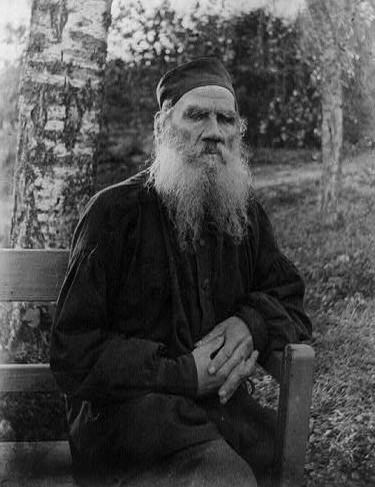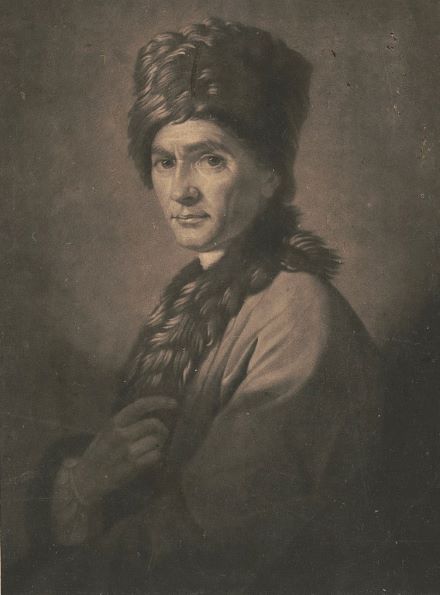- About MAA
- Membership
- MAA Publications
- Periodicals
- Blogs
- MAA Book Series
- MAA Press (an imprint of the AMS)
- MAA Notes
- MAA Reviews
- Mathematical Communication
- Information for Libraries
- Author Resources
- Advertise with MAA
- Meetings
- Competitions
- Programs
- Communities
- MAA Sections
- SIGMAA
- MAA Connect
- Students
- MAA Awards
- Awards Booklets
- Writing Awards
- Teaching Awards
- Service Awards
- Research Awards
- Lecture Awards
- Putnam Competition Individual and Team Winners
- D. E. Shaw Group AMC 8 Awards & Certificates
- Maryam Mirzakhani AMC 10 A Awards & Certificates
- Two Sigma AMC 10 B Awards & Certificates
- Jane Street AMC 12 A Awards & Certificates
- Akamai AMC 12 B Awards & Certificates
- High School Teachers
- News
You are here
Quotations in Context: Tolstoy
“A man is like a fraction whose numerator is what he is
and whose denominator is what he thinks of himself.
The larger the denominator the smaller the fraction.”
The quotation above has appeared in many publications in the 21st century, always attributed to Russian author Count Lev Nikolayevich Tolstoy (more widely known as Leo Tolstoy). The few citations provided for the quotation can all be traced back to a book published by Howard W. Eves, Return to Mathematical Circles [Eves 1988, p. 81]. Unfortunately, Eves provided no information on the original source of the quotation, and I have found no publication before 1988 that contains the same wording that Eves provides.

Photograph of Tolstoy, 1897. Public domain, Library of Congress.
One possible source that Eves may have used is a letter Tolstoy wrote a mere fifteen days before his death. Tolstoy was formally excommunicated from the Russian Orthodox Church in 1901, but the Church did not completely abandon him; in particular, Father Dimitri Troitsky continued to visit Tolstoy even after his excommunication in an effort to convince him to repent and return. When Tolstoy’s health began to fail in October 1910, Troitsky wrote to Tolstoy urging him to seek the support and guidance of the Church before it was too late. While Tolstoy politely but firmly refused this plea, their conversation continued through a few more letters. In the first paragraph of a brief reply written on November 5, Tolstoy laid out a comparison of a man to a fraction, in a manner not identical but still clearly related to the comparison that was attributed to him by Eves.
The English translation of the paragraph below is from the article “The Last Days of Leo Tolstoy" by Alexander Kaun, published in the Atlantic Monthly in March 1922:
I have received your letter, Dimitri Yegorovich, and thank you for it. I perfectly agree with you that humility is the greatest and most needful virtue. As I always say, man is like a fraction, in which the denominator indicates his opinion of himself. It is best for this denominator to be zero (complete humility), and it is terrible when it is augmented to infinity. In the first case, man has a true significance, whatever the denominator; but in the second case—none [Kaun 1922, p. 301].

Engraving of Rousseau by David Martin, based on painting by Allan Ramsay, 1766.
Public domain, Library of Congress.
While trying to track down the source of the Tolstoy quotation, I ran across an interesting earlier comparison between humans and fractions by the political philosopher Jean-Jacques Rousseau in his work Émile, ou De l’éducation, published in 1762. While Tolstoy promoted the importance of humility, Rousseau instead used a fraction metaphor to illustrate the competing goals of society and the individual:
L'homme naturel est tout pour lui: il est l'unité numérique, l'entier absolu, qui n'a de rapport qu'à lui-même ou à fon semblable. L'homme civil n'est qu’une unité fractionnaire qui tient au dénominateur, & dont la valeur est dans son rapport avec l'entier, qui est le corps social. Les bonnes institutions sociales sont celles qui savent le mieux dénaturer l'homme, lui ôter son existence absolue pour lui en donner une relative, & transporter le moi dans l'unité commune; en sorte que chaque particulier ne se croye plus un, mais partie de l’unité, & ne foit plus sensible que dans le tout [Rousseau 1762, p. 6].
The natural man lives for himself; he is the unit, the whole, dependent only on himself and on his like. The citizen is but the numerator of a fraction, whose value depends on its denominator; his value depends upon the whole, that is, on the community. Good social institutions are those best fitted to make a man unnatural, to exchange his independence for dependence, to merge the unit in the group, so that he no longer regards himself as one, but as a part of the whole, and is only conscious of the common life [Rousseau 1925, p. 7].
References
Eves, Howard W. 1988. Return to Mathematical Circles. Boston: PWS-Kent Publishing Company.
Kaun, Alexander. 1922, March. The Last Days of Leo Tolstoy: With Translations From His Diary and Letters. The Atlantic 129(3): 299-306.
Rousseau, Jean Jacques. 1762. Émile, ou De L’éducation. Vol. 1. Paris.
Rousseau, Jean Jacques. 1925. Emile or Education by J. J. Rousseau. Translated by Barbara Foxley. London: J. M. Dent & Sons, Ltd.
“Quotations in Context” is a regular column written by Michael Molinsky that has appeared in the CSHPM/SCHPM Bulletin of the Canadian Society for History and Philosophy of Mathematics since 2006 (this installment was first published in November 2014). In the modern world, quotations by mathematicians or about mathematics frequently appear in works written for a general audience, but often these quotations are provided without listing a primary source or providing any information about the surrounding context in which the quotation appeared. These columns provide interesting information on selected statements related to mathematics, but more importantly, the columns highlight the fact that students today can do the same legwork, using online databases of original sources to track down and examine quotations in their original context.
Michael Molinsky (University of Maine at Farmington), "Quotations in Context: Tolstoy," Convergence (February 2024)




